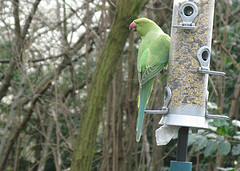There is a lot of variety in the diet of a captive Indian Ring Neck parrot, and this diet can be broken down into four main categories: Seeds, pellets, fruits and vegetables and protein.
Any healthy parrot should have a regular diet of seeds. However - it is important to note that seeds should be part of a healthy diet that include many other foods of different nutritional value. This is because a diet of purely seeds alone is not healthy for your parrot, because seeds are quite high in fat content. But remember that wild parrots actively seek out seeds as part of their diet, so you should not remove seeds from your parrot’s diet.
There is also a lot of nutritional value in pellets for your parrot. Some people will take to mixing the pellets in with a bowl of seeds to get your parrot to eat them. It has been suggested that this is a flawed method as the parrots will deliberately avoid the pellets and eat just the seeds. Instead - you should serve seeds and pellets on rotation so that your parrot has ample opportunity to benefit from both. Keep the servings moderate and swap them over every three to four days.
Indian Ring Necks really enjoy a variety of fruits out in the wild, so you should always look to include this in your parrot’s diet. Some absolute favourites for Indian Ring Necks are apples and grapes, so be sure to feature them on the menu for your parrot. However, you should also look to bring in a variety of fruits; oranges, mangos, pears, kiwis and melons for example. These fruits give very nutritious antioxidants and vitamins to your parrot, but again, they should be enjoyed in moderation.
Similarly, you should look to include some vegetables into your parrot’s diet. Chunks of carrot or even squashes of zucchini or pumpkin will really be enjoyed by your parrot. You may also wish to throw in some leafy greens when feeding your parrot to give it that variety in their diet.
Finally, you should look to include a certain amount of protein for your Indian Ring Neck. This could be a shred of cooked meat, like chicken or turkey. This should only be a small portion that is served around once a week.
Any healthy parrot should have a regular diet of seeds. However - it is important to note that seeds should be part of a healthy diet that include many other foods of different nutritional value. This is because a diet of purely seeds alone is not healthy for your parrot, because seeds are quite high in fat content. But remember that wild parrots actively seek out seeds as part of their diet, so you should not remove seeds from your parrot’s diet.
There is also a lot of nutritional value in pellets for your parrot. Some people will take to mixing the pellets in with a bowl of seeds to get your parrot to eat them. It has been suggested that this is a flawed method as the parrots will deliberately avoid the pellets and eat just the seeds. Instead - you should serve seeds and pellets on rotation so that your parrot has ample opportunity to benefit from both. Keep the servings moderate and swap them over every three to four days.
Indian Ring Necks really enjoy a variety of fruits out in the wild, so you should always look to include this in your parrot’s diet. Some absolute favourites for Indian Ring Necks are apples and grapes, so be sure to feature them on the menu for your parrot. However, you should also look to bring in a variety of fruits; oranges, mangos, pears, kiwis and melons for example. These fruits give very nutritious antioxidants and vitamins to your parrot, but again, they should be enjoyed in moderation.
Similarly, you should look to include some vegetables into your parrot’s diet. Chunks of carrot or even squashes of zucchini or pumpkin will really be enjoyed by your parrot. You may also wish to throw in some leafy greens when feeding your parrot to give it that variety in their diet.
Finally, you should look to include a certain amount of protein for your Indian Ring Neck. This could be a shred of cooked meat, like chicken or turkey. This should only be a small portion that is served around once a week.

